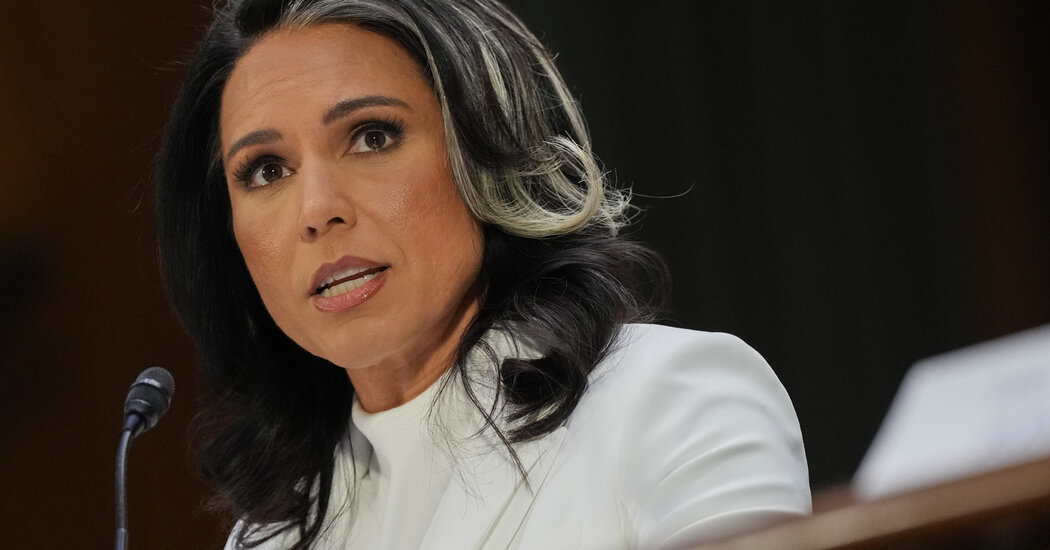The Senate Intelligence Committee on Tuesday approved Tulsi Gabbard’s nomination to become the next director of national intelligence, setting the stage for a floor vote for one of President Trump’s most contentious cabinet choices.
The vote, 9 to 8, was along party lines, with every Republican supporting Ms. Gabbard’s nomination and all Democrats in opposition.
While some Republicans harbor doubts about Ms. Gabbard, she won over the party members on the committee who were wavering, including Senator Susan Collins of Maine, who had voted against Pete Hegseth to serve as defense secretary. Senator Todd Young of Indiana had also asked tough questions in the confirmation hearing but announced his support for Ms. Gabbard in a social media post before the vote.
As he walked into the committee room, Mr. Young said he had spoken to Mr. Trump and Vice President JD Vance about the vote. He said the written assurances Ms. Gabbard had given him were critical to winning him over.
“I’ve done my work,” Mr. Young said. “I’ve done my vetting.”
Ms. Collins announced Monday that she would support Ms. Gabbard, saying she shared her vision of shrinking the size of the office and returning it to its original role of coordinating among the spy agencies. That remains the office’s primary role, but it also has analysts and intelligence managers who do their own analytic work.
Over the weekend, Ms. Gabbard also got support from Elon Musk, who called Mr. Young a “deep state puppet” on his social media platform, X. Mr. Musk deleted the post shortly afterward and wrote that he had spoken to Mr. Young. “I stand corrected,” Mr. Musk wrote. “Senator Young will be a great ally in restoring power to the people from the vast, unelected bureaucracy.”
Before the vote, Mr. Young confirmed that he had spoken with Mr. Musk but said that they had not discussed Ms. Gabbard. He said he had spoken to Mr. Trump about the vote, but that the president did not pressure him and told him to vote his conscience.
“I said, ‘How important is this to you, Mr. President?’” Mr. Young recounted. “He said it’s important. But he said, ‘You know what, Todd, we’re going to work together on all kinds of other things to make America great again.’ And I told him I need reassurances. And those were delivered.”
Ms. Gabbard assured Mr. Young, according to a letter he posted on social media, that she would hold accountable officials who make unauthorized disclosures of classified material. She also pledged not to make a recommendation about the “legal standing” of Edward Snowden, an intelligence contractor who released classified documents about American surveillance programs in 2013.
Some in Congress had thought that Ms. Gabbard’s nomination would be the trickiest of Mr. Trump’s choices, given her unorthodox views and her past service as a Democratic member of the House, where she represented Hawaii.
Democrats have remained united against her.
Senator Ron Wyden, Democrat of Oregon and a proponent of privacy rights, said he was encouraged by Ms. Gabbard’s comments on protecting whistle-blowers and her openness to changes to foreign surveillance laws.
But Mr. Wyden said he voted against her because he was not convinced she would stand up to demands for intelligence officers to be fired “for perceived disloyalty to Donald Trump.”
Senator Martin Heinrich, Democrat of New Mexico, said he had voted against Ms. Gabbard because of her history of elevating conspiracy theories and distrusting the very spy agencies she would oversee.
“Time and again, Ms. Gabbard has elevated conspiracy theories, parroted dictators’ talking points and repeatedly undermined our country’s national security,” Mr. Heinrich said in a statement. “Put plainly, Tulsi Gabbard is a national security risk. She appears to trust information from every other source but the intelligence community.”
But so far no Republicans have joined Democrats in seeking to block her nomination. Some in Congress suggested Republican opposition failed to coalesce because the stakes were lower than for other nominees. The director of national intelligence oversees other spy agencies and sets broad priorities, but the job is not as powerful as that of the C.I.A. director. That leader runs covert actions and oversees intelligence stations around the world.
The Office of the Director of National Intelligence’s most important job, arguably, is overseeing the President’s Daily Brief, an intelligence summary assembled each morning. Many Republicans believe that Mr. Trump deserves to have someone he trusts in that position.
Even before her tense hearing, Ms. Gabbard earned the support of Senator Tom Cotton, who is an Arkansas Republican and the committee’s chairman. And afterward, she secured the support of Senator John Cornyn, a Texas Republican who is an influential member of the caucus.
Ms. Gabbard had one of the most difficult confirmation hearings of any of Mr. Trump’s nominees. She dodged a series of questions that Republican lawmakers meant to be softballs, or took offense at them, giving Democrats a chance to pile on in contentious exchanges that highlighted her unorthodox views.
Senator James Lankford, Republican of Oklahoma, asked what he later said he had thought would be an easy question: Was Edward Snowden a traitor? But she declined to answer directly, giving Senator Michael Bennet, Democrat of Colorado, an opening to push hard.
“Is Edward Snowden a traitor to the United States of America?” Mr. Bennet asked in a thunderous voice. “That is not a hard question to answer.”
After the hearing, Senator John Curtis, Republican of Utah, said he still had questions. “Some of her responses, and nonresponses, created more confusion than clarity and only deepened my concerns about her judgment,” he told reporters.
But Mr. Curtis is not on the Intelligence Committee, whose Republican members fell into line and backed her nomination.
The most tense exchanges came over Ms. Gabbard’s support for Mr. Snowden, who said his disclosures revealed illegal government efforts to spy on Americans.
Ms. Gabbard came into the hearing intent on distancing herself from Mr. Snowden. But she repeatedly balked when Republicans gently, and Democrats forcefully, tried to get her to call Mr. Snowden a traitor.
She said that Mr. Snowden’s actions were illegal but that they had brought to light surveillance programs that wrongly collected information about Americans.
“The fact is, he also, even as he broke the law, released information that exposed egregious, illegal and unconstitutional programs that are happening within our government,” Ms. Gabbard said of Mr. Snowden, who fled the United States and now lives in Russia.
Ms. Gabbard and Mr. Trump have similar foreign policy views on terrorism, Russia, long military engagements and other matters. But her sympathetic stance toward Russia’s invasion of Ukraine and her defense of the government of the former Syrian leader Bashar al-Assad gave Republicans pause.
Still, the discussions about Mr. Snowden’s disclosures were the most tense in her confirmation hearing.
In a social media post before the hearing, Mr. Snowden urged Ms. Gabbard to denounce her past support for him. But she did not. He also told the lawmakers to “move on,” arguing that courts had taken Ms. Gabbard’s side and that the National Security Agency’s actions he exposed were illegal.
In 2013, Mr. Snowden, then a contractor for the N.S.A. in Hawaii, gained access to a trove of classified material. His most significant disclosure was the bulk data collection of Americans’ phone metadata.
United States Politics and Government,Surveillance of Citizens by Government,Espionage and Intelligence Services,Appointments and Executive Changes,Classified Information and State Secrets,Gabbard, Tulsi (1981- ),Trump, Donald J
#Senate #Panel #Approves #Gabbards #Nomination


